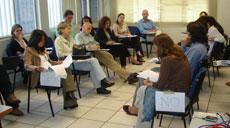Building Semantics is Different from Building the Web
Published 16 years ago by Yihong Ding
When constructing the Semantic Web, we are actually building two varied aspects simultaneously. One aspect is the Web that includes things such as the communication protocols, the Web data presentation formats, and so on. In particular, we have invented new technologies such as RDF, OWL, SPARQL, and other W3C recommended Semantic Web standards. The other aspect is the semantics that represent the meanings of Web data. Building semantics is, however, different from building the Web.
Continue reading Building Semantics is Different from Building the Web

 The Curse of Knowledge: the more you know, the more difficult it is for you to communicate knowledge. When we know something, we can hardly imagine not knowing it. The more we learn about something, the more it becomes even harder for us to think of not knowing it. It is generally difficult for experts (who know much) to explain their expertise to laymen (who know little) because experts have to try hard to imagine the scenario when they were not experts. This is the Curse of Knowledge.
The Curse of Knowledge: the more you know, the more difficult it is for you to communicate knowledge. When we know something, we can hardly imagine not knowing it. The more we learn about something, the more it becomes even harder for us to think of not knowing it. It is generally difficult for experts (who know much) to explain their expertise to laymen (who know little) because experts have to try hard to imagine the scenario when they were not experts. This is the Curse of Knowledge. We want everybody to communicate freely by crossing the barriers of language differences and cultural variety. This is the commonly agreed upon ultimate goal of the Semantic Web. How we are to realize the Semantic Web in particular is, however, another story. Typically, there are two thoughts on how to achieve this common goal. One thought is to build a web of data; the other is to build a web of agents. Nevertheless, these two thoughts approach the same goal and represent two different philosophies. This philosophical difference may eventually determine the fate of these two approaches.
We want everybody to communicate freely by crossing the barriers of language differences and cultural variety. This is the commonly agreed upon ultimate goal of the Semantic Web. How we are to realize the Semantic Web in particular is, however, another story. Typically, there are two thoughts on how to achieve this common goal. One thought is to build a web of data; the other is to build a web of agents. Nevertheless, these two thoughts approach the same goal and represent two different philosophies. This philosophical difference may eventually determine the fate of these two approaches.
Recently Commented Blog Entries